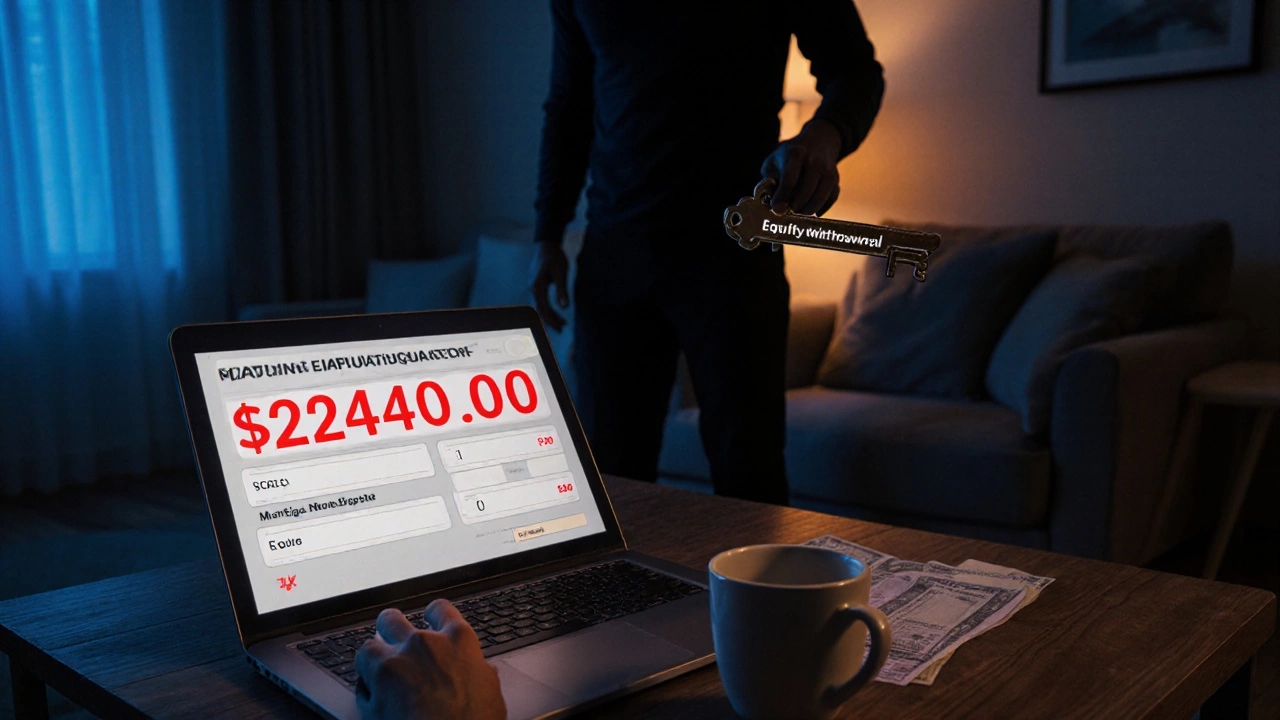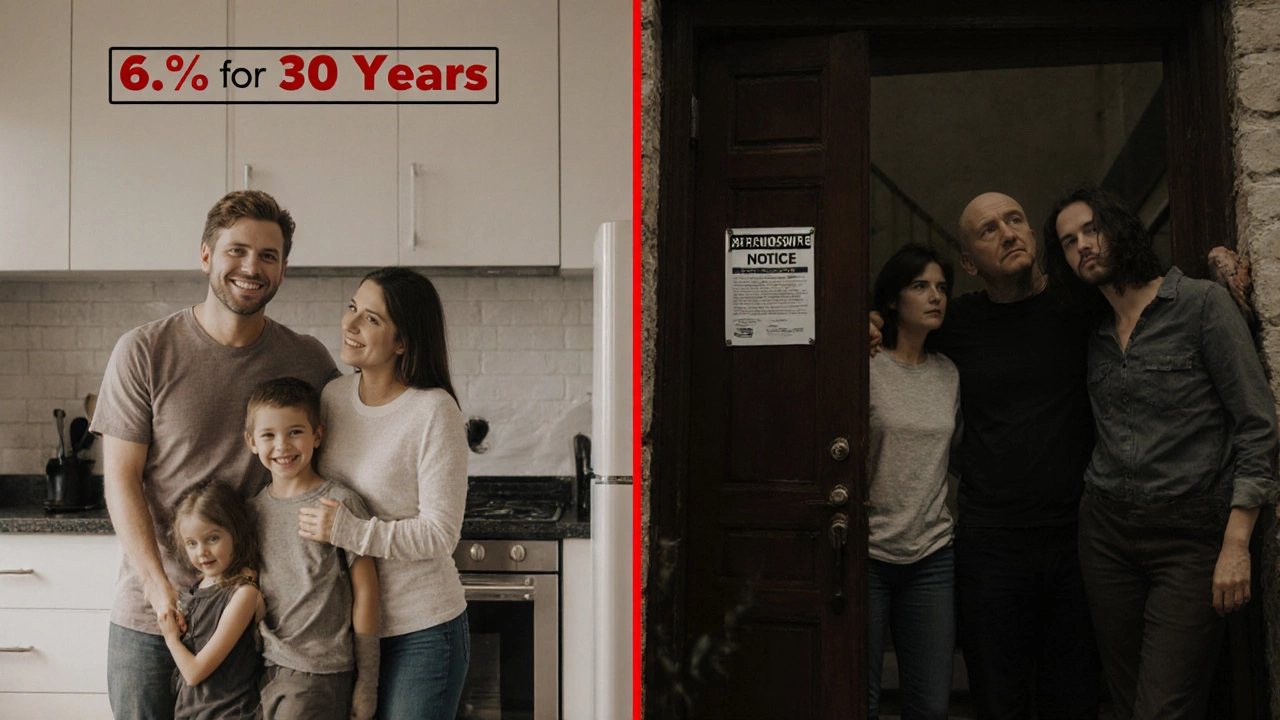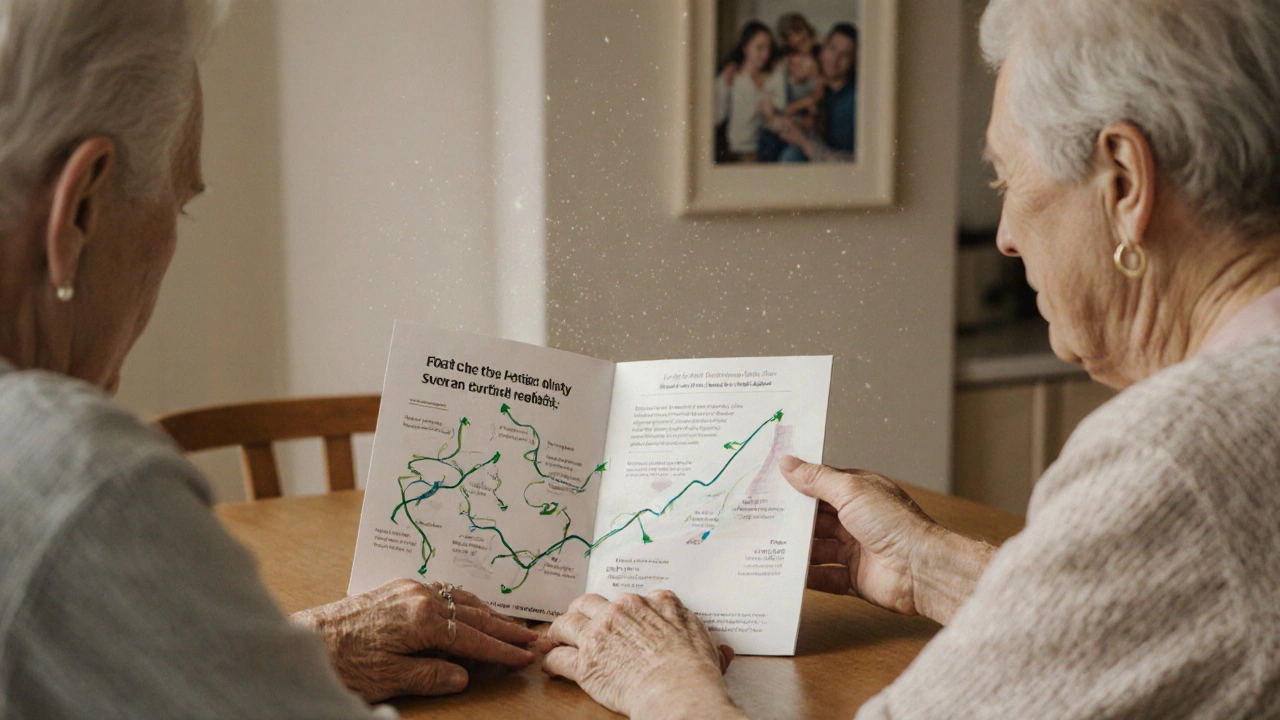Why Taking Equity Out of Your Home Is a Bad Idea
 Nov, 18 2025
Nov, 18 2025
Mortgage Cost Comparison Tool
Home Equity Loan
Alternative Options
Your home equity loan will cost $ in interest over years
This is times your original loan amount
Comparison
Critical Warning
Using home equity for non-essential expenses extends debt for decades. The article shows 40% of borrowers using cash-out refinancing simply moved credit card debt to a mortgage, extending repayment from 3 years to 30 years. This creates long-term financial risk with your most valuable asset.
Thousands of homeowners reach for equity out of their homes thinking it’s a quick fix for debt, a home renovation, or even a vacation. But pulling money out of your house isn’t like withdrawing cash from an ATM. It’s a long-term financial move with hidden costs, rising risks, and consequences that can haunt you for decades. If you’re considering tapping into your home’s value, here’s why it’s often a worse choice than you think.
You’re Trading Stability for Debt
Your home is likely your biggest asset-and your safest one. Unlike stocks or crypto, it doesn’t swing wildly in value day to day. But when you take equity out, you turn that stability into debt. Even if you get a low interest rate now, you’re locking yourself into monthly payments that won’t disappear. If your income drops, you lose your job, or medical bills pile up, you can’t pause a mortgage like you can a credit card. The bank doesn’t care about your hardship. They still expect payment, or they take your home.Between 2020 and 2023, over 1.2 million U.S. homeowners used cash-out refinancing. A 2024 Federal Reserve study found that nearly 40% of those borrowers were already carrying credit card debt. Instead of paying it off, many just moved it to their mortgage-extending the repayment from 3 years to 30. That’s not debt freedom. That’s debt delay with higher long-term cost.
Interest Adds Up Faster Than You Realize
Let’s say your home is worth $400,000 and you owe $200,000. You have $200,000 in equity. You take out $80,000 in a cash-out refinance at 6.5% over 30 years. Sounds manageable, right? You’ll pay $160,000 in interest alone. That’s twice what you borrowed. You didn’t just get $80,000-you paid $240,000 for it.Compare that to a personal loan for $80,000 at 9% over 7 years. You’d pay about $27,000 in interest. Yes, the monthly payment is higher, but you’re done in seven years. With a mortgage extension, you’re paying for decades. That’s not smart borrowing. That’s paying extra just to stretch out the pain.
Reverse Mortgages Are Not Retirement Magic
Seniors are often pushed toward reverse mortgages as a way to stay in their homes. But they come with heavy fees-up to 5% of the loan amount-and rising interest that compounds over time. A 70-year-old who takes out a $150,000 reverse mortgage today could owe $400,000 by age 85. That’s not equity you’re accessing. That’s equity you’re burning.And if you move to a nursing home, sell the house, or pass away, the loan becomes due. Your heirs don’t inherit the home-they inherit the debt. If the house sells for less than what’s owed, they’re still on the hook. Many families are blindsided by this. Reverse mortgages sound simple, but they’re one of the most misunderstood financial products on the market.
You’re Reducing Your Safety Net
Home equity is your emergency fund. If your car breaks down, your roof leaks, or your kid needs surgery, you can sell, refinance, or take a home equity line (HELOC) if you have room. But once you’ve taken it all out, you’ve got nothing left. In 2023, nearly 60% of Americans couldn’t cover a $1,000 emergency. If you’ve already used your home’s equity, you’re one job loss or medical bill away from disaster.Think of your home like a savings account you can’t touch without penalty. Once you withdraw, you can’t just deposit back in. The market doesn’t guarantee your home will go up. In fact, in 2022, home prices dropped in over 900 U.S. counties. If you’ve borrowed against equity and your home loses value, you could end up underwater-owing more than the house is worth. That locks you in. You can’t sell. You can’t refinance. You’re stuck.

It Doesn’t Fix the Real Problem
Most people take equity out because they’re struggling with spending, not because they lack income. A $50,000 home equity loan won’t fix a habit of overspending on dining, travel, or gadgets. It just moves the problem from credit cards to a mortgage. And since mortgage payments feel less urgent than credit card bills, people keep spending. The debt doesn’t disappear-it grows.Studies from the National Endowment for Financial Education show that 78% of people who use home equity to pay off credit cards end up with the same or higher credit card balances within two years. That’s not financial recovery. That’s financial roulette.
You’re Putting Your Home at Risk
Every time you borrow against your home, you’re putting it on the line. Unlike unsecured debt, your house is collateral. Miss three payments on a credit card? Your credit score takes a hit. Miss three payments on a home equity loan or cash-out refinance? The bank can start foreclosure proceedings. In 2023, over 70,000 homes entered foreclosure in the U.S. because homeowners couldn’t keep up with mortgage payments after tapping equity.And if you’re retired or on a fixed income, your options shrink. You can’t go back to work full-time. You can’t take on side gigs. Your income is set. Your mortgage isn’t. That’s a dangerous mismatch.
There Are Better Ways to Get Cash
You don’t need to risk your home to get money. Here’s what actually works:- Side income: Freelancing, tutoring, renting a room, or selling unused items can bring in $500-$2,000 a month with no debt.
- Personal loans: If you have decent credit, you can get a 3-7 year loan at 8-12%. Pay it off fast. No home on the line.
- Debt consolidation: Combine high-interest debts into one lower-rate loan-without touching your home.
- Downsize: Sell your house, move to a smaller one, and pocket the difference. No loans. No risk.
- Delay big purchases: Wait six months. If you still need the money, you’ll know it’s a real need-not a fleeting want.
These options don’t feel as exciting as writing a check from your home’s equity. But they don’t put your roof at risk either.

When It Might Make Sense (And Even Then, Be Careful)
There are rare cases where taking equity out makes sense:- You’re doing a high-return home improvement-like a kitchen remodel that adds 80-100% of its cost to your home’s value.
- You’re refinancing high-interest debt (like 20% credit cards) into a 6% mortgage, and you’ve fixed the spending habits that got you there.
- You’re retired, have no other assets, and need income to cover basic living costs-with no other options.
Even then, only do it if you’ve spoken to a fee-only financial planner (not a loan officer) and have a written plan to pay it off in 10 years or less. Most people don’t. That’s why most equity releases end in regret.
What Happens If You Already Did It?
If you’ve already taken equity out and are struggling:- Don’t ignore it. Contact your lender before you miss a payment.
- Look into loan modification programs. Many banks will lower payments or extend terms if you ask early.
- Stop using credit cards. Every new charge makes your situation worse.
- Consider a housing counselor. Nonprofits like HUD-approved agencies offer free advice and can help you negotiate.
The clock is ticking. The longer you wait, the harder it gets to fix.
Is it ever smart to take equity out of your home?
It’s only smart if you’re using the money for something that increases your home’s value or replaces much higher-interest debt-and you have a solid plan to pay it back within 10 years. Most people don’t meet these conditions. If you’re doing it to fund lifestyle spending, it’s a bad idea.
What’s the difference between a home equity loan and a cash-out refinance?
A home equity loan is a second mortgage-you keep your original loan and add another one with its own payment. A cash-out refinance replaces your entire mortgage with a new, larger one. You get cash upfront, but you reset your loan term to 30 years, even if you had 10 years left. That means you pay more interest over time.
Can you lose your home if you take equity out?
Yes. If you fail to make payments on a home equity loan, HELOC, or cash-out refinance, the lender can foreclose. Your home is the collateral. That’s the biggest risk. Unlike credit cards, there’s no safety net.
How much equity should you keep in your home?
Financial experts recommend keeping at least 20% equity as a buffer. That means if your home is worth $300,000, you should owe no more than $240,000. This gives you room to handle market dips, emergencies, or unexpected repairs without going underwater.
Are reverse mortgages a good option for seniors?
Only as a last resort. Reverse mortgages come with high fees, compounding interest, and the risk that your heirs will owe money after you pass. Seniors should explore Social Security, part-time work, downsizing, or government aid before considering one. Many seniors are pressured into them by aggressive sales tactics.
